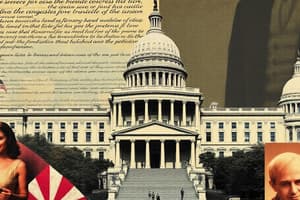Podcast
Questions and Answers
What was a major weakness of the Articles of Confederation?
What was a major weakness of the Articles of Confederation?
- It granted full authority to state governments.
- It provided for a bicameral legislature.
- It lacked the power to tax. (correct)
- It established a strong central government.
Which clause in the Constitution allows Congress to pass laws necessary for executing its powers?
Which clause in the Constitution allows Congress to pass laws necessary for executing its powers?
- Commerce Clause
- Necessary and Proper Clause (correct)
- Equal Protection Clause
- Supremacy Clause
What key argument did Federalists present in favor of the Constitution compared to Anti-Federalists?
What key argument did Federalists present in favor of the Constitution compared to Anti-Federalists?
- An effective government required stronger central authority. (correct)
- A strong national government could lead to tyranny.
- States should retain complete sovereignty over all powers.
- The Constitution does not protect individual rights.
Which amendment is part of the Bill of Rights?
Which amendment is part of the Bill of Rights?
How can Congress check the powers of the executive branch?
How can Congress check the powers of the executive branch?
Flashcards
Articles of Confederation weaknesses
Articles of Confederation weaknesses
The Articles of Confederation, the first US government, had several flaws, including a weak central government, no power to tax, and inability to regulate commerce.
Articles vs. Constitution
Articles vs. Constitution
The Constitution strengthened the federal government compared to the Articles, resolving issues like taxation and commerce regulation.
Shays' Rebellion
Shays' Rebellion
A 1786 uprising demonstrating the weaknesses of the Articles of Confederation and the need for a stronger national government.
Federalists
Federalists
Signup and view all the flashcards
Anti-Federalists
Anti-Federalists
Signup and view all the flashcards
Federalist Papers
Federalist Papers
Signup and view all the flashcards
Brutus 1
Brutus 1
Signup and view all the flashcards
Legislative Branch
Legislative Branch
Signup and view all the flashcards
Legislative Powers
Legislative Powers
Signup and view all the flashcards
Executive Branch
Executive Branch
Signup and view all the flashcards
Executive Powers
Executive Powers
Signup and view all the flashcards
Judicial Branch
Judicial Branch
Signup and view all the flashcards
Judicial Powers
Judicial Powers
Signup and view all the flashcards
Necessary & Proper Clause
Necessary & Proper Clause
Signup and view all the flashcards
Commerce Clause
Commerce Clause
Signup and view all the flashcards
Supremacy Clause
Supremacy Clause
Signup and view all the flashcards
Due Process Clause
Due Process Clause
Signup and view all the flashcards
Equal Protection Clause
Equal Protection Clause
Signup and view all the flashcards
Constitutional Amendments
Constitutional Amendments
Signup and view all the flashcards
Amending the Constitution
Amending the Constitution
Signup and view all the flashcards
Bill of Rights
Bill of Rights
Signup and view all the flashcards
Equality Amendments
Equality Amendments
Signup and view all the flashcards
Limited Government
Limited Government
Signup and view all the flashcards
Natural Rights
Natural Rights
Signup and view all the flashcards
Republicanism
Republicanism
Signup and view all the flashcards
Social Contract
Social Contract
Signup and view all the flashcards
Study Notes
Articles of Confederation
- Major weaknesses
- Comparison to Constitution
Shays' Rebellion
- Role in Constitution development
Federalists vs. Anti-Federalists
- Stances on the Constitution
- Federalist Papers (#10 & #51) and Brutus 1 arguments
Legislative Branch (Congress)
- Specific powers
- Checks on executive and judicial branches
- Bicameral structure
Executive Branch (President)
- Specific powers
- Checks on legislative and judicial branches
Judicial Branch (Courts)
- Specific powers
- Checks on executive and legislative branches
Constitutional Provisions
- Necessary and proper clause (Article I, Section 8)
- Commerce clause (Article I, Section 8)
- Supremacy clause (Article VI)
- Due process clause (5th and 14th Amendments)
- Equal protection clause (14th Amendment)
Constitutional Amendments
- Methods of passage
- Flexibility of the Constitution
Amendments to Study
- Bill of Rights (1-10)
- Equality Amendments (13, 14, 15, 19)
Ideals of Democracy
- Limited government
- Natural rights
- Republicanism
- Social contract
Studying That Suits You
Use AI to generate personalized quizzes and flashcards to suit your learning preferences.




